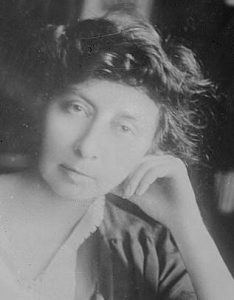The Rules
“It’s a man’s world—that’s the size of it.
What’s the use of knocking your head against things you can’t change?”
Life isn’t fair. We know it. But can’t we wish it were impartial…that at least life weren’t unfair? That way, in a world where we all have different gifts, some opportunities are earned, or at least deserved. Some losses are really our own fault. And at least we have a chance: if we are gracious and giving, diligent and dedicated, above the fray but sympathetic to those who are not, to find ourselves rewarded.
In the world of A Man’s World, life’s ground rules are the superficial and the underlying subject, and Rachel Crothers’s loving realization of that world is a thought-provoking and heart-stirring play.
Frank Ware is by most everyone’s lights one of the best. Living on her own terms in 1910 Greenwich Village, she is a rising novelist documenting New York’s underclass, esteemed for breaking the stereotypes of women writers, well-loved by a vibrant circle of striving artists, and the loving foster mother to an orphaned boy. Independent but generous, successful but modest, she lives at a vital moment in art and amidst fomenting social awareness, which she marries in her work with a vigor fitting the age. And personally best, she is falling guardedly (because so passionately) in love with a man every bit her intellectual and spirited equal.
But grace and virtue have no easy time of it in the world we know. Frank’s appeal makes her the target of a resentful diva and would-be romantic rival. Her open nature invites gossiping speculation among her closest friends. And her selfless devotion to her adopted son fuels doubts in the man she loves. Soon, questions of her boy’s parentage take over her closest relationships, and Frank finds her ideals and her self at odds with the petty discontents of a world she always risen above. Her conclusion, and that of the play, is inspiring and crushing at once.
In Rachel Crothers’s hands, this personal story overflows with personable characters and touching warmth. An independent woman herself, writing plays in a watershed decade for women’s rights, she creates in Frank a character at once dignified and playful, practical and imaginative, rebellious and poised, tolerant and impatient, nurturing and daring. Her bohemian friends are no less savvy, and they are all touching in each their different ways as they pursue difficult lives off the beaten path. Finally, the conventional man who challenges her is no dull guardian of the status quo, but a thoughtful and giving foil for her iconoclastic ideals. The play’s scenes, effortlessly flowing between the private and the communal, are delightful stagecraft, built with sparkling natural dialogue, and filled heartfelt yearnings, triumphs, and disappointments. The Times called the 1910 premiere “remarkably fine,” and unfolding in an old mansion cum boarding house, it is a play wonderfully suited today to Metropolitan’s intimate stage.
Breaking Free
In 1910, the obvious and timely subject of A Man’s World was a double standard for the freedoms permitted men and women generally, and particularly in the aftermath of broken affairs. The father of a child out of wedlock could live as a respected man with a rakish past; the mother was a ruined woman, saddled with responsibility and condemned to scorn for bearing it. Today, this divide may seem less sharp, though a casual look at popular media—entertainment, advertisements, and even headlines—show the sexes still to play by very different rules. Moreover, in the private crises of 1910 artists, struggling in each their own way to live creatively in a conventional world, the play confronts and explores inequities in life well beyond sexism. The barriers to transcending social mores are central to every character’s life in the play, and their individual acceptance, defiance, or evasion of the rules is heart-warming and -breaking at once. The compromises faced by the collection of artists are familiar to everyone who has seen a new idea take wing and come too near the sun, or never coming near enough. Lastly, the doubtful shelter offered ideal love by a human heart resonates throughout. The play’s now hundred-year-old portrait freshly captures countless truths for the disenfranchised–whether they are made so by gender, orientation, faith, race, or temperament–forced to sacrifice either herself or her hope of acceptance, even by those she loves.
Metropolitan Playhouse first presented a memorable production of A Man’s World in 1999. This year, to begin our season of Justice, we bring the play to life with an all new production to ask again if we can hope for a fair shake in the world we live in—or at least for what we deserve.
– Alex Roe
 Rachel Crothers (1878 – 1958), the daughter of two Illinois physicians, graduated high school at the age of 13, and studied dramatic arts in Boston the following year. Though she returned to Illinois for several years, following her father’s death and with her mother’s support, she moved to New York at age 19, and devoted herself to the stage. She gave up her acting career as her plays received production and notice, and was able to make her living and career as a prolific and highly regarded playwright of searching dramas as well as lighter comedies, always with an inquisitive to critical eye on the mores and of her age. She wrote some 23 plays (often directing their premieres), among them The Three of Us (1903), Nice People (1921), Mary the Third (1923), Expressing Willie(1924), As Husbands Go (1931.) Recent New York area productions include He and She (1920) at East Lynne Theatre Company in 2011; Susan and God (1937) and A Little Journey (1918) at The Mint in 2006 and 2011 respectively.
Rachel Crothers (1878 – 1958), the daughter of two Illinois physicians, graduated high school at the age of 13, and studied dramatic arts in Boston the following year. Though she returned to Illinois for several years, following her father’s death and with her mother’s support, she moved to New York at age 19, and devoted herself to the stage. She gave up her acting career as her plays received production and notice, and was able to make her living and career as a prolific and highly regarded playwright of searching dramas as well as lighter comedies, always with an inquisitive to critical eye on the mores and of her age. She wrote some 23 plays (often directing their premieres), among them The Three of Us (1903), Nice People (1921), Mary the Third (1923), Expressing Willie(1924), As Husbands Go (1931.) Recent New York area productions include He and She (1920) at East Lynne Theatre Company in 2011; Susan and God (1937) and A Little Journey (1918) at The Mint in 2006 and 2011 respectively.
